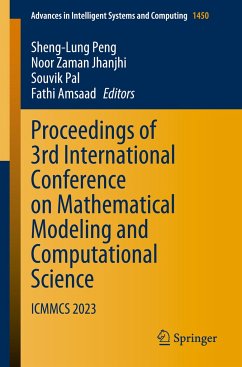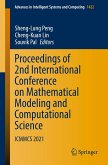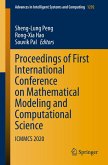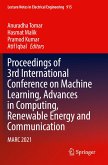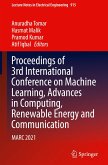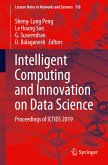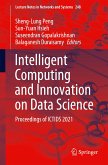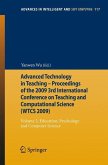Proceedings of 3rd International Conference on Mathematical Modeling and Computational Science
ICMMCS 2023
Herausgegeben:Peng, Sheng-Lung; Jhanjhi, Noor Zaman; Pal, Souvik; Amsaad, Fathi
Proceedings of 3rd International Conference on Mathematical Modeling and Computational Science
ICMMCS 2023
Herausgegeben:Peng, Sheng-Lung; Jhanjhi, Noor Zaman; Pal, Souvik; Amsaad, Fathi
- Broschiertes Buch
- Merkliste
- Auf die Merkliste
- Bewerten Bewerten
- Teilen
- Produkt teilen
- Produkterinnerung
- Produkterinnerung
The volume is a collection of high-quality, peer-reviewed research papers presented at the Third International Conference on Mathematical Modeling and Computational Science (ICMMCS 2023), held during 24 - 25 February 2023 in hybrid mode. The topics covered in the book are mathematical logic and foundations, numerical analysis, neural networks, fuzzy set theory, coding theory, higher algebra, number theory, graph theory and combinatory, computation in complex networks, calculus, differential educations and integration, application of soft computing, knowledge engineering, machine learning,…mehr
Andere Kunden interessierten sich auch für
![Proceedings of 2nd International Conference on Mathematical Modeling and Computational Science Proceedings of 2nd International Conference on Mathematical Modeling and Computational Science]() Proceedings of 2nd International Conference on Mathematical Modeling and Computational Science177,99 €
Proceedings of 2nd International Conference on Mathematical Modeling and Computational Science177,99 €![Proceedings of First International Conference on Mathematical Modeling and Computational Science Proceedings of First International Conference on Mathematical Modeling and Computational Science]() Proceedings of First International Conference on Mathematical Modeling and Computational Science154,99 €
Proceedings of First International Conference on Mathematical Modeling and Computational Science154,99 €![Proceedings of 3rd International Conference on Machine Learning, Advances in Computing, Renewable Energy and Communication Proceedings of 3rd International Conference on Machine Learning, Advances in Computing, Renewable Energy and Communication]() Proceedings of 3rd International Conference on Machine Learning, Advances in Computing, Renewable Energy and Communication154,99 €
Proceedings of 3rd International Conference on Machine Learning, Advances in Computing, Renewable Energy and Communication154,99 €![Proceedings of 3rd International Conference on Machine Learning, Advances in Computing, Renewable Energy and Communication Proceedings of 3rd International Conference on Machine Learning, Advances in Computing, Renewable Energy and Communication]() Proceedings of 3rd International Conference on Machine Learning, Advances in Computing, Renewable Energy and Communication154,99 €
Proceedings of 3rd International Conference on Machine Learning, Advances in Computing, Renewable Energy and Communication154,99 €![Intelligent Computing and Innovation on Data Science Intelligent Computing and Innovation on Data Science]() Intelligent Computing and Innovation on Data Science117,99 €
Intelligent Computing and Innovation on Data Science117,99 €![Intelligent Computing and Innovation on Data Science Intelligent Computing and Innovation on Data Science]() Intelligent Computing and Innovation on Data Science169,99 €
Intelligent Computing and Innovation on Data Science169,99 €![Advanced Technology in Teaching - Proceedings of the 2009 3rd International Conference on Teaching and Computational Science (WTCS 2009) Advanced Technology in Teaching - Proceedings of the 2009 3rd International Conference on Teaching and Computational Science (WTCS 2009)]() Advanced Technology in Teaching - Proceedings of the 2009 3rd International Conference on Teaching and Computational Science (WTCS 2009)243,99 €
Advanced Technology in Teaching - Proceedings of the 2009 3rd International Conference on Teaching and Computational Science (WTCS 2009)243,99 €-
-
-
The volume is a collection of high-quality, peer-reviewed research papers presented at the Third International Conference on Mathematical Modeling and Computational Science (ICMMCS 2023), held during 24 - 25 February 2023 in hybrid mode. The topics covered in the book are mathematical logic and foundations, numerical analysis, neural networks, fuzzy set theory, coding theory, higher algebra, number theory, graph theory and combinatory, computation in complex networks, calculus, differential educations and integration, application of soft computing, knowledge engineering, machine learning, artificial intelligence, big data and data analytics, high performance computing, network and device security, Internet of Things (IoT).
Produktdetails
- Produktdetails
- Advances in Intelligent Systems and Computing 1450
- Verlag: Springer / Springer Nature Singapore / Springer, Berlin
- Artikelnr. des Verlages: 978-981-99-3610-6
- 1st ed. 2023
- Seitenzahl: 584
- Erscheinungstermin: 29. August 2023
- Englisch
- Abmessung: 235mm x 155mm x 30mm
- Gewicht: 979g
- ISBN-13: 9789819936106
- ISBN-10: 9819936101
- Artikelnr.: 67985373
- Herstellerkennzeichnung Die Herstellerinformationen sind derzeit nicht verfügbar.
- Advances in Intelligent Systems and Computing 1450
- Verlag: Springer / Springer Nature Singapore / Springer, Berlin
- Artikelnr. des Verlages: 978-981-99-3610-6
- 1st ed. 2023
- Seitenzahl: 584
- Erscheinungstermin: 29. August 2023
- Englisch
- Abmessung: 235mm x 155mm x 30mm
- Gewicht: 979g
- ISBN-13: 9789819936106
- ISBN-10: 9819936101
- Artikelnr.: 67985373
- Herstellerkennzeichnung Die Herstellerinformationen sind derzeit nicht verfügbar.
Sheng-Lung Peng is a Professor and the director (head) of the Department of Creative Technologies and Product Design, National Taipei University of Business, Taiwan. He received the PhD degree in Computer Science from the National Tsing Hua University, Taiwan. He is an honorary Professor of Beijing Information Science and Technology University, China, and a visiting Professor of Ningxia Institute of Science and Technology, China. He is also an adjunct Professor of Mandsaur University, India. Dr. Peng has edited several special issues at journals, such as Soft Computing, Journal of Internet Technology, Journal of Real-Time Image Processing, International Journal of Knowledge and System Science, MDPI Algorithms, and so on. His research interests are in designing and analyzing algorithms for Bioinformatics, Combinatorics, Data Mining, and Network areas in which he has published over 100 research papers. Professor Dr Noor Zaman Jhanjhi (N.Z Jhanjhi) is currently a Professor in Computer Science, Program Director for the Postgraduate Research Programme in computer science at the School of Computer Science at Taylor's University, Malaysia. He has been nominated as the world's top 2% research scientist globally for 2022. He has been nominated as outstanding faculty by the MDEC Malaysia for 2022. He has highly indexed publications in WoS/ISI/SCI/Scopus, and his collective research Impact factor is more than 700 plus points. His H index is 44, while more than 500 publications are on his credit. He has several international Patents on his account, including Australian, German, and Japanese. He edited/authored over 40 research books published by world-class publishers, including Springer, Taylors and Frances, Willeys, Intech Open, IGI Global USA, etc. He has excellent experience supervising and co-supervising postgraduate students, and more than 30 Postgraduate scholars graduated under his supervision. Prof. Jhanjhi serves as Associate Editor and Editorial Assistant Board for several reputable journals, such as PeerJ Computer Science, CMC Computers, Materials & Continua, Computer Systems Science and Engineering CSSE and Frontier in Communication and Networks. He received Outstanding Associate Editor for IEEE ACCESS. Active reviewer for a series of top-tier journals has been awarded globally as a top 1% reviewer by Publons (Web of Science). He is an external Ph.D./Master thesis examiner/evaluator for several universities globally. He has completed more than 40 internationally funded research grants successfully. He has served as a Keynote/Invited speaker for more than 60 international conferences globally, and chaired international conference sessions internationally. He has vast experience in academic qualifications, including ABET, NCAAA, and NCEAC, for 10 years. His research areas include Cybersecurity, IoT security, Wireless security, Data Science, Software Engineering, and UAVs. Dr. Souvik Pal is an Associate Professor in the Department of Computer Science and Engineering at Sister Nivedita University (Techno India Group), Kolkata, India. Prior to that, he was associated with Global Institute of Management and Technology; Brainware University, Kolkata; JIS College of Engineering, Nadia; Elitte College of Engineering, Kolkata; and Nalanda Institute of Technology, Bhubaneswar, India. Dr. Pal received his MTech, and PhD degrees in the field of Computer Science and Engineering from KIIT University, Bhubaneswar, India. He has more than a decade of academic experience. He is author or co-editor of more than 15 books from reputed publishers, including Elsevier, Springer, CRC Press, and Wiley, and he holds three patents. He is serving as a Series Editor for "Advances in Learning Analytics for Intelligent Cloud-IoT Systems", published by Scrivener-Wiley Publishing (Scopus-indexed); "Internet of Things: Data-Centric Intelligent Computing, Informatics, and Communication", published CRC Press, Taylor & Francis Group, USA; "Conference Proceedings Series on Intelligent Systems, Data Engineering, and Optimization", published CRC Press, Taylor & Francis Group, USA; Dr. Pal has published a number of research papers in Scopus / SCI/SCIE Journals and conferences. He is the organizing chair of RICE 2019, Vietnam; RICE 2020 Vietnam; ICICIT 2019, Tunisia. His professional activities include roles as Associate Editor, Guest Editor, and Editorial Board member for more than 100+ international journals and conferences of high repute and impact. His research area includes cloud computing, big data, internet of things, wireless sensor network, and data analytics. He is a member of many professional organizations, including MIEEE; MCSI; MCSTA/ACM, USA; MIAENG, Hong Kong; MIRED, USA; MACEEE, New Delhi; MIACSIT, Singapore; and MAASCIT, USA. Dr. Fathi Amsaad is an Assistant Professor in the Department of Computer Science and Engineering at Wright State University, Dayton, OH. In 2017, he received a PhD in Engineering,with an emphasis on Computer Science and Engineering, from the Electrical Engineering and Computer Science Department at the University of Toledo (UT), Toledo, Ohio, USA. He taught several courses in Computer Science, Computer Engineering, Electronics and Electrical Engineering, and Cybersecurity domain, including Hardware Security, CMOS-VLSI Design/Testing, Computer Architecture, Design of Computer Systems with FPGA, and Wireless Communications and Networking. His research in the area of Hardware-oriented Security aims to enable Trust, Assurance, Authentication, and Reliability in Microelectronics and Embedded System Applications. This includes hardening chip-level security for IoT Applications, Reconfigurable Computing Platforms and Very Large-Scale Integration (VLSI) Systems.
Chapter 1: Neuro-Fuzzy Logic Application in Speech Recognition.- Chapter 2: A Machine Learning Model for Predicting Covid-19.- Chapter 3: Thyroid Disease Prediction using a Novel Classification Enhancing MLP and Random Forest Algorithms.- Chapter 4: Youtube Sentimental Analysis using a Combined Approach of KNN and K-Means Clustering Algorithm.- Chapter 5: Big Data Analytics: Hybrid Classification in Brain Images using BSO and SVM.- Chapter 6: Breast Cancer Detection using Hybrid Segmentation using FOA and FCM Clustering.- Chapter 7: Hybrid Optimization using CC and PSO in Cryptography Encryption for Medical Images.- Chapter 8: Boundary Element Method for Water Wave Interaction with Semi-circular Porous Wave Barriers Placed over Stepped Seabed.- Chapter 9: Fostering Stem Education Competency for Elementary Education Students at Universities of Pedagogy in Vietnam.- Chapter 10: Blockchain based E-Medical Data Storage for Privacy Protection. etc.
Chapter 1: Neuro-Fuzzy Logic Application in Speech Recognition.- Chapter 2: A Machine Learning Model for Predicting Covid-19.- Chapter 3: Thyroid Disease Prediction using a Novel Classification Enhancing MLP and Random Forest Algorithms.- Chapter 4: Youtube Sentimental Analysis using a Combined Approach of KNN and K-Means Clustering Algorithm.- Chapter 5: Big Data Analytics: Hybrid Classification in Brain Images using BSO and SVM.- Chapter 6: Breast Cancer Detection using Hybrid Segmentation using FOA and FCM Clustering.- Chapter 7: Hybrid Optimization using CC and PSO in Cryptography Encryption for Medical Images.- Chapter 8: Boundary Element Method for Water Wave Interaction with Semi-circular Porous Wave Barriers Placed over Stepped Seabed.- Chapter 9: Fostering Stem Education Competency for Elementary Education Students at Universities of Pedagogy in Vietnam.- Chapter 10: Blockchain based E-Medical Data Storage for Privacy Protection. etc.

